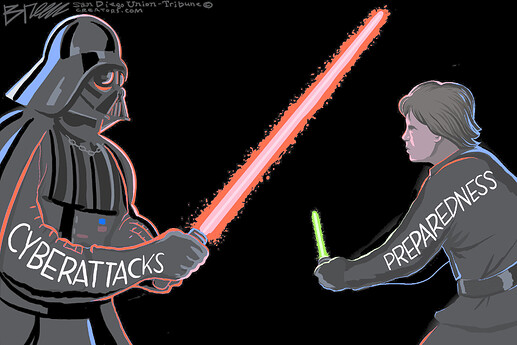sigh. This could spell the deathnell for logical increments.
Tulips, Tulips, Tulips!
That’s so last week. The up-and-coming thing is soundcard-mining. Which is why I just bought stock in all the companies that make soundcards! /s
Some people are making a lot of profit off this whole mess, selling shovels to the miners.
Time to nationalize 'em.
The problem, of course, that it’s asymmetric: the bad guys can fail over and over, but the good guys only need to fail once before they lose.
We designed networks to be open, and it’s really hard to close them up without inconveniencing the employees.
That said, I am really shocked that Microsoft hasn’t hardened Windows enough to kill this trend dead. We have our Exchange server locked down so tight now that it’s annoying, but so far we have not been attacked successfully.
I guess for some companies it’s also a matter of not wanting to spend any money to prevent a possible attack.
In the case of the pipeline, I wonder who’s really behind it. Did some lackey come up with the idea (to hurt Biden and prop up oil prices), convinced Trump (after explaining it 7 times), who then asked Putin to do it. Or did the oil companies (or Koch) ask Putin or paid for it themselves?
How much could Microsoft do about it if people are still using outdated systems (because their machinery or old software requires them or whatever), and if people continue to run malware and open phishing emails? I could be wrong, but I’d hazard a guess that all the systems in the company aren’t running the latest Win10, and all the people using them aren’t consistently using the best security practices.
I agree to an extent. If you are still using older systems (and I am guilty; personally, I still use Win7, and will continue to as long as I can get support.)
But on fully-updated Win10 for the enterprise (which we have) this shouldn’t be happening. We are well protected, but we’ve had to lock down our machines, our networks, and our internet access far beyond what should be required.
I tried to do an update for win8.1 on an old laptop (orig win7) and was told it was no longer supported. How is win7 still getting it?
Paid support for two corporate versions of Windows 7 is available through early 2023, though they strongly recommend that you upgrade to Win 10 ASAP. They provide some security updates but no enhancements. My labs use some instrumentation that has not been upgraded. Since it does not connect to our internal networks or the public internet, we feel that the risk is acceptable and mitigated. We will be changing to new instrumentation in 2022, but in the meantime, we’re paying for support. My at-home personal hardware is included in that support agreement.
Oh, that makes sense.
I’ve heard of this but never really had to deal with it, thank goodness. Every instrument I worked with had an analog or RBG output that was easy to convert to digital with the right A/D board. Back in the [cough] [wheeze] good old days.
My only problem with this kind of thing was a one-off laptop I got early on that had a nice 4x3 aspect ratio screen (which I prefer) and lots of power (mostly for analysis and image-related stuff) for the time. Eventually TPTB wanted me to get rid of it because of the old operating system. Their replacements were the cheapest things you could imagine, because the agency wide IT folks mostly dealt with office workers. Us lab people were only a small minority of folks. I could have my office and lab computers separate, with the latter off the internet, but that seemed really unwieldy since I had to send data and results back and forth to people outside the agency – other researchers and journals (who were getting into digital uploads of papers).
Maybe I was being a pain . . .
Yes, it’s a huge pain in the ass. In this case, it’s a clinical trials lab, and the instrumentation is atomic absorption spectrometers that are used for detecting levels of metals in blood with very high accuracy.
There is newer and better instrumentation available now, but it simply isn’t done to change instrumentation during a clinical trial. Best case, it would require an adjustment to the protocol; worst case, it might invalidate or call into question several years and many millions of dollars in research.
It actually reports results via good ol’ 2400 bps serial data to our data acquisition system, and has no other connections, so this is about as safe as can be.
That particular CT has another year to go, and which point we’ll sell off the old stuff and buy new if we have an ongoing need for it.
My personal use of Win7 is just me being stubborn. When I can’t use it anymore, I’ll probably have to break down and use Win10, at least in some form. But not until I have no other choice. In the the meantime, everything else in our house is Win10 or Linux, and we’re well-protected by a NAT firewall, good malware protection, and fanatical backups.

